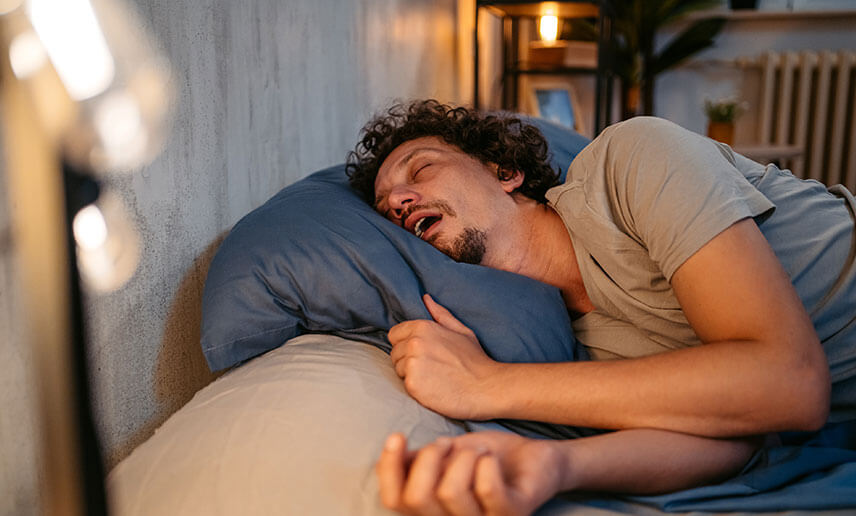Jan 31, 2025
How can I stop snoring? Expert solutions for a quieter night

Snoring is more than just a nighttime nuisance - it can affect your sleep quality, impact relationships, and even be a sign of an underlying health condition like obstructive sleep apnoea (OSA). If you've ever wondered, "how can I stop snoring?", the first step is understanding why it happens.
Snoring occurs when airflow through the mouth and nose is partially blocked during sleep. This can be caused by:
- Mouth and throat anatomy: A thick or long soft palate can restrict airflow.
- Nasal congestion: Allergies, sinus infections, or a deviated septum can make breathing difficult.
- Age: Throat muscles weaken over time, increasing the likelihood of snoring.
- Lifestyle factors: Being overweight, consuming alcohol before bed, and sleeping on your back can all contribute.
For some, snoring is a minor inconvenience, but for others, it may indicate sleep apnoea, a serious condition that requires professional treatment.
Lifestyle changes to reduce snoring
Simple adjustments to your daily routine can help reduce or even eliminate snoring.
1. Maintain a healthy weight
Carrying excess weight, particularly around the neck, can place pressure on the airway, making snoring more likely. Losing even a small amount of weight can have a positive impact.
2. Adjust your sleep position
Sleeping on your back often worsens snoring, as your tongue and soft tissues collapse into the airway. Try sleeping on your side to keep your airway clear. If you struggle to stay in position, a body pillow or positional therapy device can help.
3. Avoid alcohol and sedatives
Alcohol and sedatives relax the throat muscles, making snoring worse. Avoid these substances, particularly in the hours before bedtime, to maintain better airway control during sleep.
4. Improve your sleep routine
Poor sleep habits can contribute to snoring. Establish a consistent sleep schedule, aim for 7–9 hours of quality sleep, and create a relaxing bedtime routine to improve overall sleep quality.

Medical treatments for snoring
If lifestyle changes aren’t enough, medical intervention may be necessary.
1. Obstructive sleep apnoea treatment at SOP
Snoring can be a symptom of obstructive sleep apnoea (OSA), a condition where breathing repeatedly stops and starts during sleep. At Specialist Orthodontic Practice, we provide custom oral appliances designed to reposition the jaw and keep the airway open, offering an effective alternative to CPAP machines for many patients.
2. CPAP therapy
A continuous positive airway pressure (CPAP) machine is the most common treatment for moderate to severe sleep apnoea. It delivers a steady flow of air through a mask, preventing airway collapse.
3. Custom-made dental devices
Mandibular advancement devices (MADs) or custom oral appliances can help reposition the lower jaw and tongue to keep the airway open, reducing snoring. These are particularly effective for patients with mild to moderate sleep apnoea.
4. Surgical options
In some cases, surgery may be necessary to remove excess throat tissue, reposition the jaw, or correct structural issues such as a deviated septum that contributes to snoring.
Home remedies for snoring
If you're looking for additional ways to stop snoring, these simple home remedies may help:
- Stay hydrated: Dry airways can increase snoring, so drink plenty of water throughout the day.
- Use a humidifier: Dry air can irritate nasal passages, leading to snoring. A humidifier can help keep the air moist.
- Try nasal strips or a nasal dilator: These can physically open nasal passages to improve airflow, especially if congestion is a problem.
When to seek professional help
If your snoring is loud, persistent, and accompanied by gasping, choking, or excessive daytime fatigue, it could indicate obstructive sleep apnoea. Untreated sleep apnoea can lead to serious health risks, including high blood pressure, heart disease, and daytime drowsiness that affects daily life.
At Specialist Orthodontic Practice, we offer expert consultations and advanced treatments to help you stop snoring and improve your sleep quality. Book a consultation today to take the first step toward a quieter, healthier night’s sleep.










